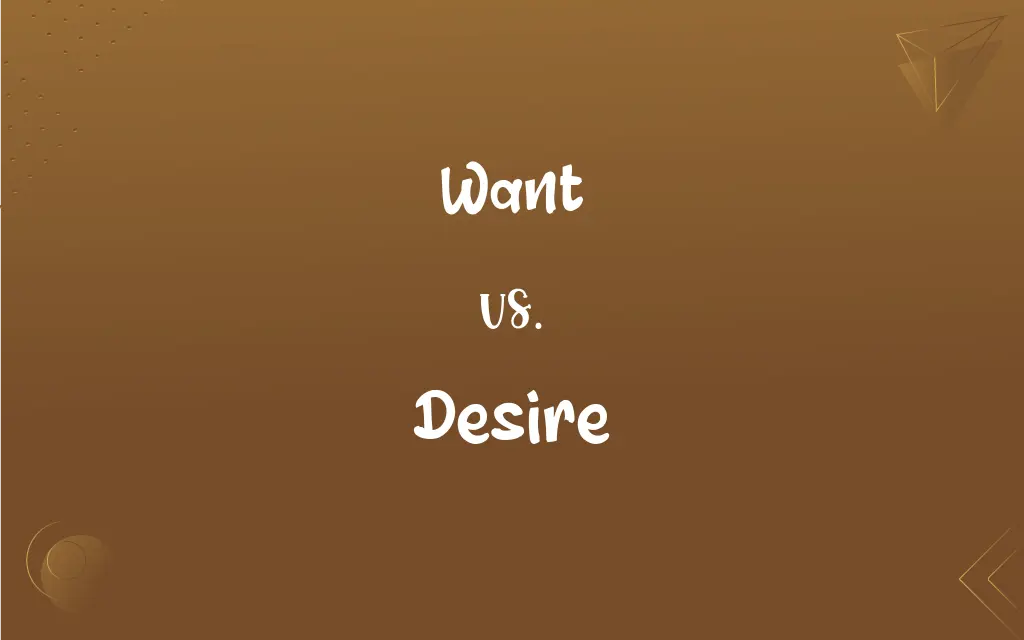Want vs. Desire: What's the Difference?
Edited by Harlon Moss || By Janet White || Published on December 14, 2023
"Want" often implies a need or a lack of something, whereas "desire" suggests a deeper, more intense longing or craving.

Key Differences
"Want" usually indicates a need or deficiency, often practical or basic, like "wanting food." "Desire," on the other hand, conveys a stronger, more emotional or passionate longing, such as "desiring success."
"Want" is commonly used in everyday language for expressing needs or preferences. "Desire" tends to be more formal or poetic, often associated with deeper wishes or aspirations.
In the context of goals and aspirations, "want" may refer to simpler or more immediate goals, while "desire" implies a deeper, possibly more complex or long-term aspiration.
"Want" can express a straightforward request or requirement, such as "wanting assistance." "Desire" often encapsulates a more profound or intense emotional state, like "desiring companionship."
Both "want" and "desire" can be interchangeable in some contexts, but "desire" typically carries a connotation of greater intensity and depth compared to the more everyday or practical "want."
ADVERTISEMENT
Comparison Chart
Intensity
Generally less intense, practical
More intense, emotional
Usage
Common in everyday language
More formal, poetic
Goal Context
Simpler, immediate goals
Deeper, long-term aspirations
Expression
Straightforward needs or requests
Profound emotional states
Interchangeability
More interchangeable in casual use
Less interchangeable, specific connotation
ADVERTISEMENT
Want and Desire Definitions
Want
Want may express a requirement or necessity.
We want more time to finish the project.
Desire
Desire might suggest a yearning for something higher.
Her desire for knowledge is endless.
Want
Want can indicate a desire for something missing.
He wants affection in his life.
Desire
In a romantic context, desire often refers to attraction.
They shared a mutual desire for each other.
Want
In economics, want denotes an unmet need.
The market wants a more efficient solution.
Desire
Desire can denote a deep aspiration or ambition.
His desire to explore the world is inspiring.
Want
Want refers to a lack or need of something.
She wants a new pair of shoes.
Desire
Philosophically, desire is a drive towards a goal or ideal.
His desire for peace shaped his actions.
Want
Want can imply a wish to possess or do something.
I want to travel the world.
Desire
Desire implies a strong longing or craving.
She has a strong desire to succeed in her career.
Want
To have a strong feeling to have (something); wish (to possess or do something); desire greatly
She wants a glass of water. They want to leave.
Desire
To wish or long for; want
A reporter who desires an interview.
A teen who desires to travel.
FAQs
What is the basic difference between want and desire?
Want often indicates a need or lack, while desire suggests a deeper longing.
Can desire be practical?
While often emotional, desire can also relate to practical goals, though usually with greater intensity.
Can want and desire be used interchangeably?
In some contexts, yes, but desire usually carries a stronger, more emotional connotation.
Is desire always emotional?
Typically, it has a more emotional or intense aspect compared to want.
How is want used in economic terms?
In economics, want refers to unmet needs or demands.
Does desire imply a deeper aspiration?
Generally, it suggests a deeper or more profound aspiration.
How do children express want and desire?
Children express want for immediate needs and desires for deeper longings.
Is want more common in everyday language?
Yes, want is more commonly used for everyday needs and preferences.
How does want function in a sentence?
Want typically indicates a need or preference, as in "I want a coffee."
Is desire linked to specific goals?
Yes, it often relates to specific, sometimes ambitious, goals.
Can want express urgency?
Yes, want can express urgency or necessity.
Is desire associated with romance?
In romantic contexts, desire often refers to deep attraction.
Can desire be short-term?
While often long-term, desires can also be immediate but are usually intense.
Can want indicate a lack of something?
Yes, it often signifies a lack or absence of something needed.
Is want used in formal writing?
Want is used in both formal and informal contexts, fitting the context's tone.
Does desire have a philosophical meaning?
In philosophy, desire often relates to a drive or pursuit of ideals.
Is desire always positive?
Not necessarily; it can be positive or negative, depending on context and perspective.
How do advertisers use want and desire?
Advertisers often use want to highlight a need and desire to create a sense of longing for a product or lifestyle.
How does context affect the use of desire?
The context, whether romantic, aspirational, or philosophical, often dictates the intensity and depth of desire.
Can want be emotional?
While typically practical, want can sometimes carry emotional undertones.
About Author
Written by
Janet WhiteJanet White has been an esteemed writer and blogger for Difference Wiki. Holding a Master's degree in Science and Medical Journalism from the prestigious Boston University, she has consistently demonstrated her expertise and passion for her field. When she's not immersed in her work, Janet relishes her time exercising, delving into a good book, and cherishing moments with friends and family.
Edited by
Harlon MossHarlon is a seasoned quality moderator and accomplished content writer for Difference Wiki. An alumnus of the prestigious University of California, he earned his degree in Computer Science. Leveraging his academic background, Harlon brings a meticulous and informed perspective to his work, ensuring content accuracy and excellence.







































































